CRM vs Marketing Automation: The Ultimate 2025 Comparison
In the rapidly evolving digital marketing world, businesses face a constant challenge: how to attract, nurture, and retain customers effectively. Two technologies have emerged as essential tools for meeting this challenge — Customer Relationship Management (CRM) systems and Marketing Automation platforms.
Although they often work hand-in-hand, CRM and Marketing Automation serve distinct purposes. Understanding these differences can help you make smarter technology investments and build a more efficient growth strategy.
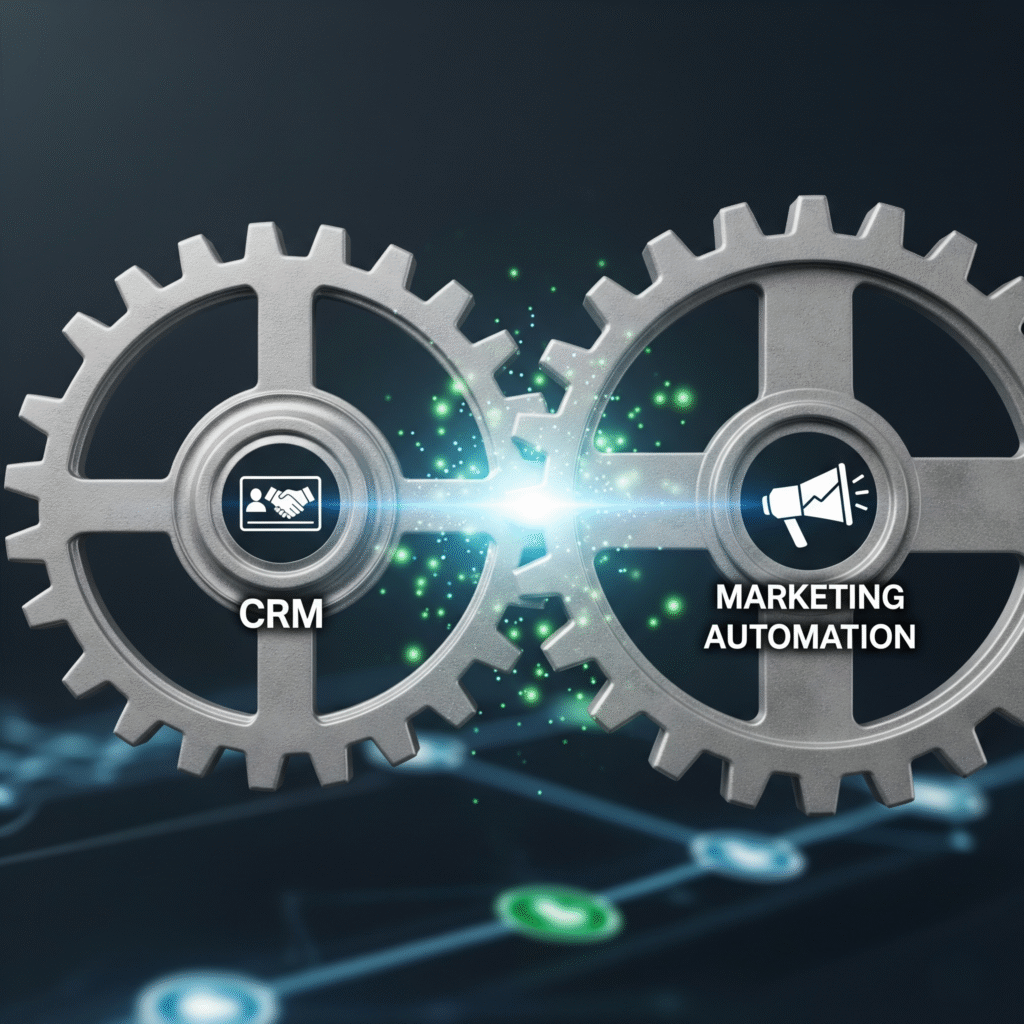
CRM vs Marketing Automation: Key Differences
A Customer Relationship Management (CRM) system is a centralized platform for storing and managing all customer-related information.
It is primarily used by sales and customer service teams to track interactions, manage pipelines, and strengthen relationships with existing and potential customers.
- 📇 Contact Management – Keep detailed records of customers and prospects.
- 📊 Sales Tracking – Monitor lead progress and deal status.
- 🎯 Task & Activity Management – Assign and track follow-up actions.
- 📈 Performance Analytics – Understand sales trends and team efficiency.
Popular CRM Tools:
Salesforce, HubSpot CRM, Zoho CRM, Monday CRM, Pipedrive.
What is Marketing Automation?
Marketing Automation is software that automates repetitive marketing tasks, enabling consistent engagement with leads and customers.
It is primarily used by marketing teams to generate and nurture leads before they are ready to speak with sales.
Key Functions of Marketing Automation:
- 📧 Email Campaign Automation – Send targeted emails based on user actions.
- 🛠 Lead Nurturing – Deliver personalized content at each buying stage.
- 📱 Social Media Scheduling – Automate posts across multiple platforms.
- 🔍 Behavior Tracking – Monitor website visits, clicks, and form submissions.
Popular Marketing Automation Tools:
ActiveCampaign, Marketo, Mailchimp, HubSpot Marketing Hub.
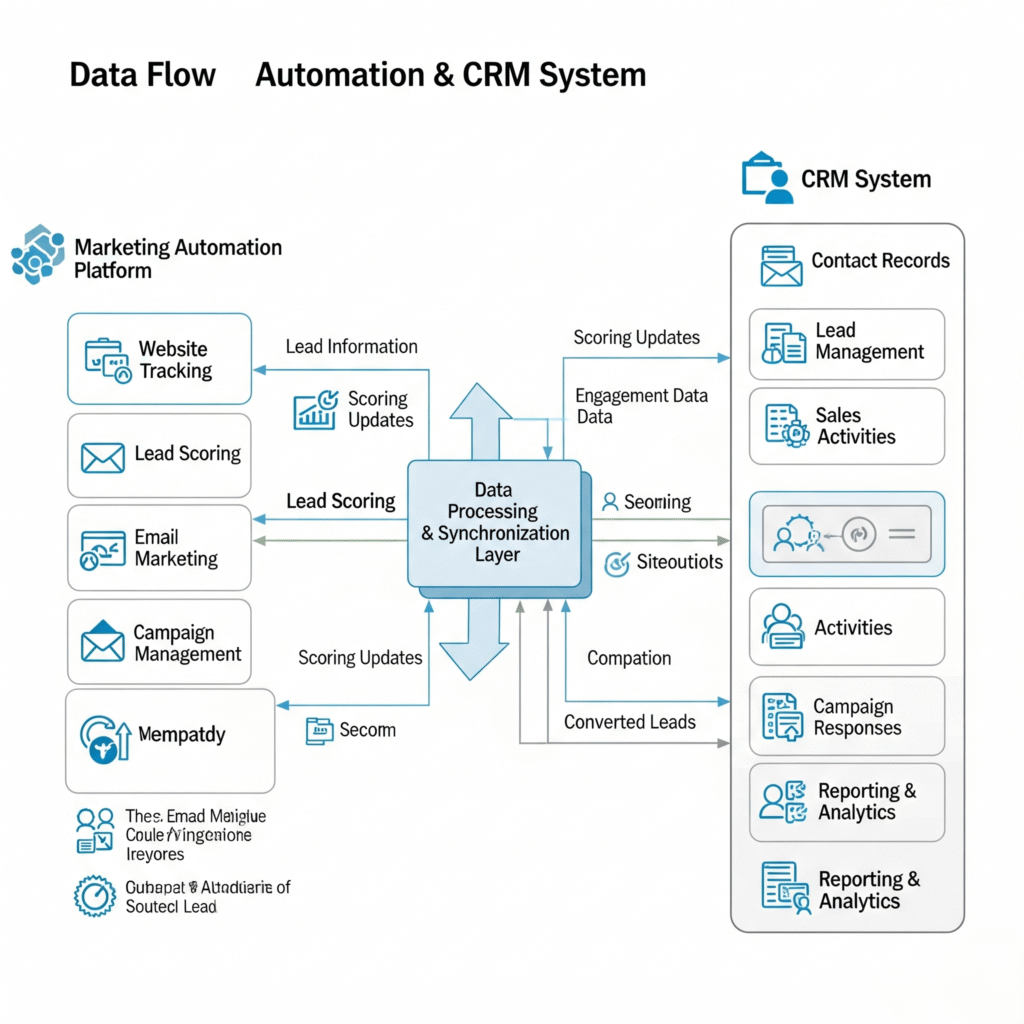
CRM vs Marketing Automation: The Core Differences
| Feature | CRM | Marketing Automation |
|---|---|---|
| Purpose | Manage and track customer relationships | Automate marketing campaigns and workflows |
| Primary Users | Sales teams, customer service | Marketing teams, content managers |
| Stage in Funnel | Post-lead acquisition (closing & retention) | Pre- and mid-funnel (attracting & nurturing) |
| Data Focus | Contact details, deal tracking, history | Behavior data, engagement metrics |
| Goal | Close more deals and retain customers | Generate and nurture qualified leads |
How CRM and Marketing Automation Work Together
Instead of choosing one over the other, the real power comes from combining both.
Here’s an example workflow:
- Lead Capture – Marketing Automation collects leads via forms and landing pages.
- Lead Nurturing – Automated emails and targeted ads engage the lead.
- Sales Handoff – Once the lead shows purchase intent, CRM assigns it to a sales rep.
- Closing the Deal – CRM tracks meetings, proposals, and negotiations.
- Ongoing Relationship – CRM ensures continued engagement and support.
With both systems integrated, your marketing team can focus on generating and nurturing leads, while your sales team focuses on closing deals and keeping customers happy.
CRM vs Marketing Automation
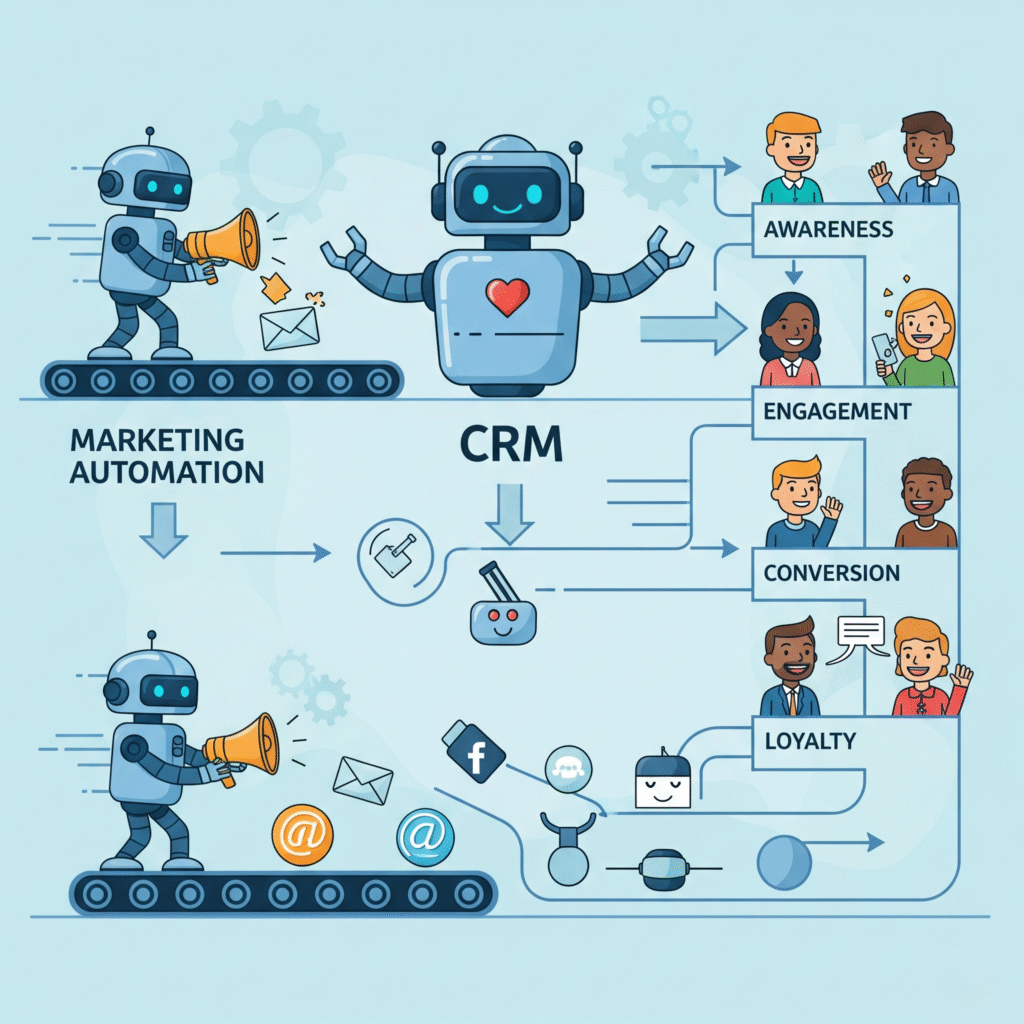
Benefits of Using Both CRM and Marketing Automation
✅ Better Lead Quality – Leads are warmed up before reaching sales.
✅ Improved Personalization – Marketing automation sends the right message at the right time.
✅ Higher Efficiency – Automation reduces manual work, and CRM keeps all data organized.
✅ Data-Driven Decisions – Insights from both tools help optimize campaigns and sales strategies.
✅ Increased Revenue – Stronger coordination between sales and marketing improves conversion rates.
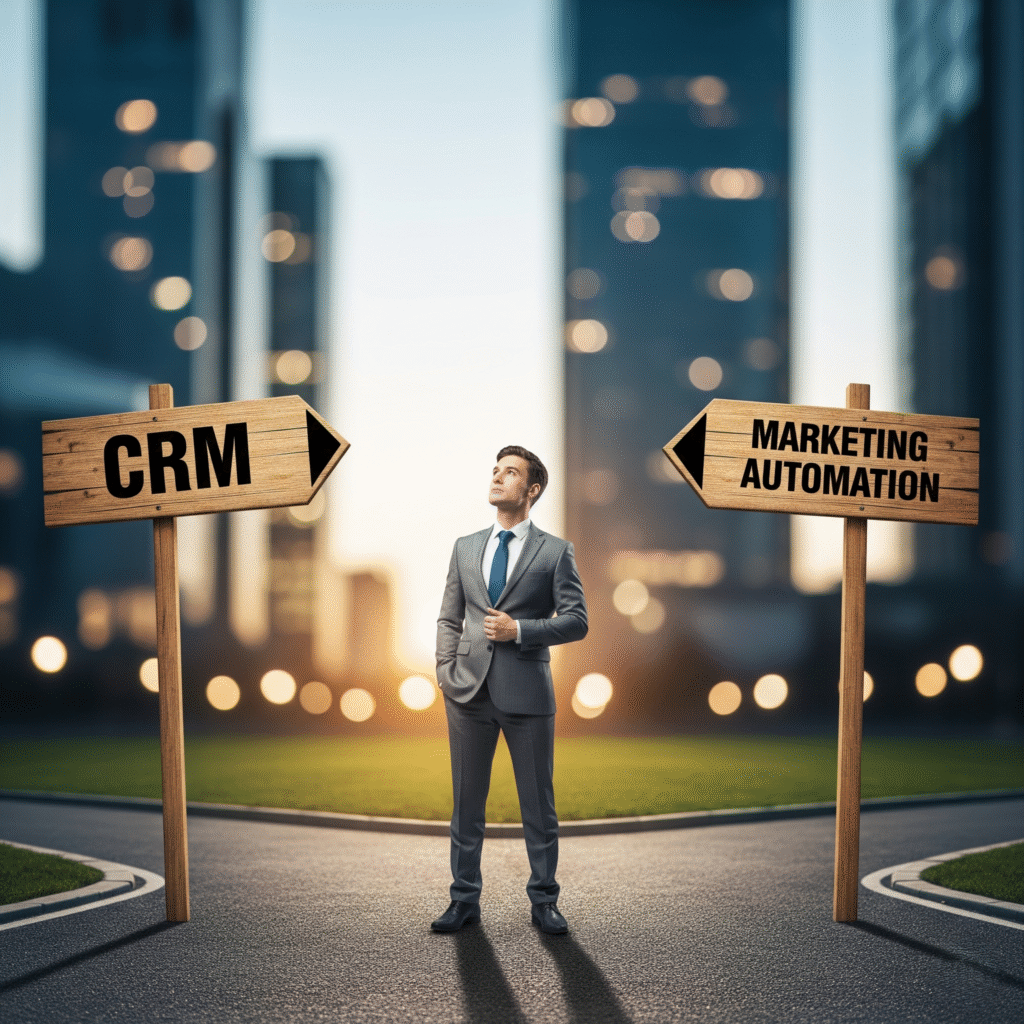
When to Invest in CRM vs Marketing Automation
If your priority is closing more deals and managing existing customers, start with a CRM.
If your goal is generating and nurturing leads, invest in Marketing Automation first.
Best Practice: Over time, integrate both for maximum results.
CRM vs Marketing Automation
📊 Real-World Examples of CRM vs Marketing Automation in Action
Understanding CRM vs Marketing Automation becomes much easier when we see how real businesses use these tools in everyday operations. Let’s explore a few scenarios:
1. A Small E-commerce Store
- CRM: Tracks each customer’s purchase history, preferred payment methods, and delivery addresses.
- Marketing Automation: Sends personalized product recommendations and discount codes via email after a customer abandons their cart.
Result: The store improves retention rates by targeting customers with relevant offers and reduces cart abandonment by 20%.
2. A B2B Software Company
- CRM: Records lead interactions, meeting notes, and proposal status for each prospect.
- Marketing Automation: Automates lead nurturing emails, webinar reminders, and follow-up sequences.
Result: Sales teams spend less time manually following up, and the business shortens its sales cycle by 30%.
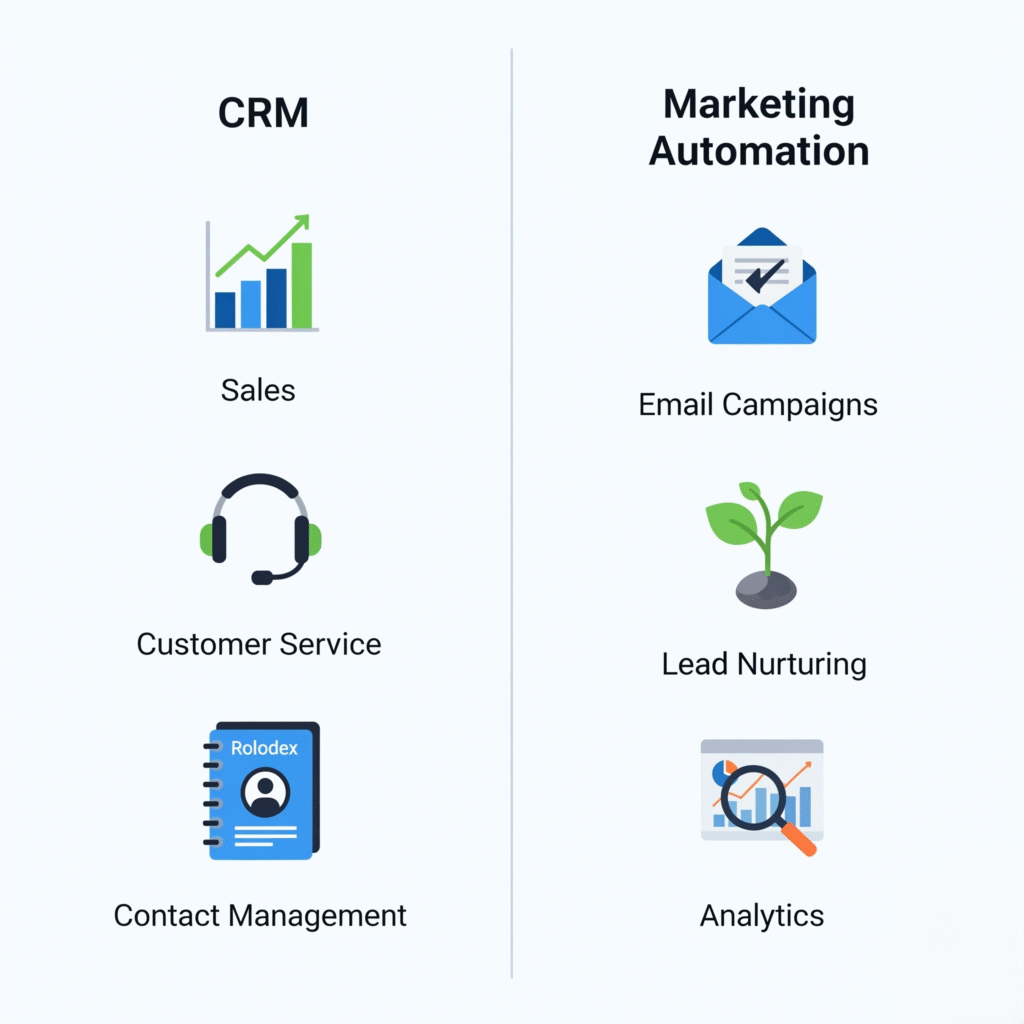
🛠 Key Features Comparison Table
Here’s a quick visual breakdown of the differences in CRM vs Marketing Automation:
| Feature | CRM | Marketing Automation |
|---|---|---|
| Primary Purpose | Customer relationship management | Campaign automation and lead nurturing |
| Main Users | Sales teams | Marketing teams |
| Data Focus | Customer interactions & history | Marketing campaigns & engagement |
| Key Benefit | Improves customer service | Increases lead conversion rates |
| Best For | Tracking customer data | Sending targeted marketing campaigns |
🔍 Benefits of Using CRM and Marketing Automation Together
While many businesses compare CRM vs Marketing Automation as if they’re mutually exclusive, the truth is—they work best when integrated.
- Unified Customer View: A connected system ensures marketing and sales teams have access to the same data.
- Better Lead Quality: Marketing automation nurtures leads, and CRM helps sales close them faster.
- Consistent Communication: Customers receive timely, personalized messages at every stage.
- Data-Driven Decisions: Combined analytics help businesses adjust strategies based on accurate performance reports.
CRM vs Marketing Automation
💡 Best Practices for Choosing Between CRM and Marketing Automation
If you’re unsure which tool to start with, consider these tips:
- Identify Your Business Goals
- If you need to manage customer relationships, start with a CRM.
- If your goal is to automate marketing campaigns, start with marketing automation.
- Evaluate Your Current Team
- Sales-heavy teams benefit more from CRM initially.
- Marketing-focused teams should prioritize automation tools.
- Set a Budget
- Some platforms offer both CRM and automation features in one plan—compare pricing carefully.
- Plan for Scalability
- Choose tools that can grow with your business.
- Avoid short-term fixes that may limit future expansion.
📈 Future Trends in CRM vs Marketing Automation
Looking ahead, both CRM and marketing automation will become smarter with AI integration.
- AI-Powered CRM: Predictive analytics to forecast customer needs and sales opportunities.
- AI in Marketing Automation: Automated ad optimization, AI-generated content, and advanced personalization.
- Voice Integration: CRMs integrating voice commands for faster data entry.
- Omnichannel Experience: Marketing automation platforms managing customer journeys across email, SMS, social media, and chatbots seamlessly.
These trends mean the CRM vs Marketing Automation debate will shift toward “How can we combine them for maximum ROI?”
CRM vs Marketing Automation
Final Thoughts
In 2025’s competitive business environment, CRM and Marketing Automation are no longer optional — they’re essential.
Marketing automation ensures no lead slips through the cracks, while CRM ensures every customer relationship is tracked, nurtured, and maximized.
Checkout our latest blog content 👇

